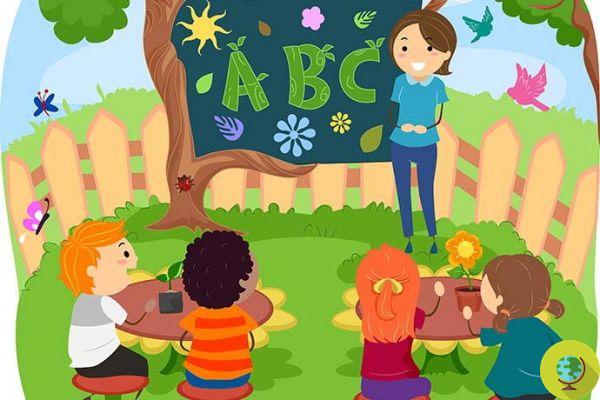
Let's be clear: the problem lies not in the use of the video game itself, but in the abuse that is too often made of it. The speed of the action, the rapid succession of different situations, the fun or suspense generated by the narrative intertwining, the realism or the charm of the settings easily capture the attention of the little ones, pushing them to forget or set aside all the rest and, in some cases, also influencing their behavior.
Don't store avocado like this: it's dangerous
If you have children o grandchildren from 5/6 years upwards, it will probably have happened to you, at least once, to see them busy with theirs game laptop or focus on computer at home, unable to detach themselves from their video game and regardless of any external stimulus and any other possibility of entertainment. Between children e Gamesin fact, a very close bond which almost ends up creating a kind of addiction.
Let's be clear: the the problem is not in the use of the video game itself, but in the abuse that is too often made of it. The speed of the action, the rapid succession of different situations, the fun or suspense generated by the narrative intertwining, the realism or the charm of the settings easily capture the attention of the little ones, pushing them to forget or set aside all the rest and, in some cases, also influencing their behavior.
The real challenge for a parent is not to categorically prohibit video games but to push their child to balance your hobbies, to know how to dedicate different times to different activities and to be aware of the importance of the time you have available. For this reason, the prohibitions, the imperatives and the "methods of impact" (like unplugging the screen, remove games from the home computer and the like) are not particularly suitable, as their first effect is not to distract the child's attention from the game, but to make him feel frustrated. Perceiving himself as the victim of an injustice, your child will take advantage of all possible opportunities to "secretly" cultivate his passion for video games, even devising some subterfuge and soon learning to get around obstacles ...
Much better, therefore, to try strategies aimed at empower the child, as one parent explains on the blog americano Eartheasy, recounting their personal experience. So here are his advice, from parent to parent:
Index
Play a video game with your child
Let your child show you his favorite video games and teach you how to play. Whatever your opinion on the game in question (educational, funny or censurable ...), you will have shown your child that you are open to new things and that you have no preclusions towards his world and his choices. Simply put, you are offering him a example to follow and you will be more credible when you ask him not to spend all his time playing video games and to devote himself to other activities as well.
For a week, take note of the time your child spent watching video games
Ask your child to hold a diario time spent playing or keep it in place. After a week, draw a little graphic starting from this diary (you do not need schematizations or too complex and elaborate diagrams: just offer your little one a immediately understandable visual representation of the free time he spent in front of the screen). This way, you will not only help your child quantify the time he spends playing games but, when you tell him that he spends too many hours focusing only on video games, you will have evidence to show him to reinforce your claim!
Show your child what and how many other activities they could fill their time span playing video games
With a little effort, you can make a list of outdoor activities playful, recreational or sporting that your child could play in the time span he devotes daily to video games. He could learn to play one strumento musicale, or try your hand at one sports, play outdoors, go in bicycle, take care of a garden… And carry out many other simple activities that the video game ends up stealing time from. The goal is for the child to understand that the time spent playing prevents him from doing anything else and that this something else could be enjoyable, fulfilling and fun even more than a video game.
Organize indoor or outdoor activities for your child and their friends
Help your child to design and organize alternative activities and pastimes to video games, perhaps involving his friends: the possibilities are so many - from the timeless outdoor games, perfect if you have a little space, ai board games, To reading, drawing, To kitchen… - just choose the activity on the basis of the character, talent and tastes of your child, so that you find it pleasant and captivating.
Embark on a long-term project of his or her choice with your child
Children are not used to long-term thinking or acting, but they always choose activities they offer results, fun and instant gratification: like, precisely, video games. So try to involve them in a long-term project that is consistent with their character and that can tickle their curiosity. The possibilities are almost endless: to plant and grow fiori in garden, pledging to heal and care for them, or build one house for dolls or one skateboard, sew and decorate a abito or costume of Carnival... in short, be creative and, above all, commit to following and supporting your children in the realization of their project, helping them both to find the necessary tools and materials and to complete the work.
Recognize your child's accomplishments in video game “replacement” activities
Children love to be gratified: this is one of the reasons for the success of video games, which more often than not offer immediate recognition. Therefore, when your child engages in activities other than video games, always remember to acknowledge and praise theirs commitment and underline yours results, so that he is stimulated to perfect and improve his performances.
Get the family to have lunch and / or dinner together
The video game is a solitary pastime: even when you play in company, you are always very focused on yourself and do not spend energy to socialize. This loneliness must somehow be balanced by creating opportunities for dialogue and communication: for example, i Easter they represent precious moments in which the family can get together and tackle the most diverse topics together. So, commit yourself to dedicating at least one meal a day to your loved ones and to dialogue with your children!
Lisa Vagnozzi


























